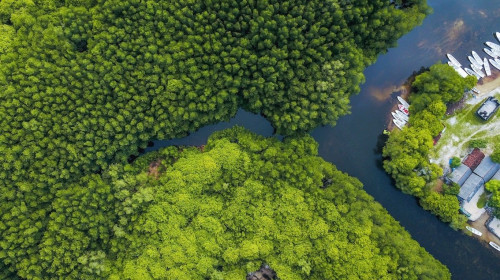Ecosystem-based Adaptation (EbA); also known as nature-based solutions for climate change adaptation is increasingly gaining policy support and being implemented by diverse actors around the world. EbA is defined as “the use of biodiversity and ecosystem services as part of an overall adaptation strategy to help people adapt to the adverse effects of climate change.” It involves the conservation, sustainable management, and restoration of ecosystems, thereby enhancing the resilience of ecosystems and communities to climate-related risks. EbA has broad applications across diverse sectors in fostering sustainable development and can help achieve multiple benefits for nature and human well-being.
While EbA guidebooks, case studies, and principles have contributed to standardising the EbA approach, there is a clear need for further training opportunities to strengthen EbA implementation across diverse sectors while ensuring that rights-based approaches, gender equity, and better outcomes for biodiversity and ecosystems are achieved.
This EbA course, developed for a global audience, will equip learners with transferable and replicable skills in designing and implementing EbA initiatives by offering targeted training on key principles, risk assessments, monitoring, and governance. A key aim of the course is to increase EbA knowledge outside of the environmental conservation community, helping participants integrate EbA solutions into other sectors—including infrastructure, water, agriculture, public works, and social development—to better link research and science with practice.
The course targets decision-makers in public and private organisations; professionals who may not be familiar with EbA but who work in a related field (development, infrastructure, agriculture, integrated water resources management); civil society organisations; actors at community, national, and global scales; early-career EbA professionals, current students, and university faculty; and EbA practitioners from both the Global North and Global South.
The EbA MOOC is the product of a collaboration between Deutsche Gesellschaft für Internationale Zusammenarbeit (GIZ), International Union for Conservation of Nature (IUCN), and the International Institute for Sustainable Development (IISD), with financial support from the Federal Ministry for the Environment, Nature Conservation, Nuclear Safety and Consumer Protection (BMUV), Global Affairs Canada as part of the Nature for Climate Adaptation Initiative funded by the Government of Canada, and the Global EbA Fund. It builds on a decade of research, experience, and strong partnerships in implementing EbA.
Target Audience
Professionals who may not be familiar with EbA but who work in a related field (development, infrastructure, agriculture, integrated water resources management)
Civil society organisations
Decision makers in public and private organisations
Actors at community, national, and global scales
Early-career EbA professionals, current students, and university faculty
EbA practitioners from both the Global North and Global South.
Learning Objectives
- Understand the role of EbA within an overall climate change adaptation strategy.
- Be able to plan EbA activities in a logical order and apply EbA best practices.
- Consider and integrate social aspects, such as gender, livelihoods, and traditional knowledge, into EbA projects.
- Understand how to mainstream EbA across sectors.








